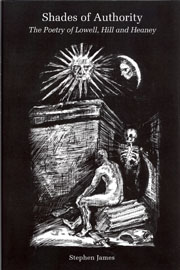Introduction
Summary
The title of this book holds in tension a number of competing ideas. At its simplest, it indicates that various kinds of authority, according to differing shades of implication in the term, are considered in the works of Robert Lowell, Geoffrey Hill and Seamus Heaney. Yet it also offers metaphorical possibilities for describing the relationship between poetry and power: in one sense, it conveys the impression of these three writers as admonitory shades passing judgement, like Shelley's ‘unacknowledged legislators’, upon matters of political or cultural control – with the attendant suggestion that their verse might be said to constitute a shadow-form of authority. In another sense, it intimates that the poets are mere pale shades, masters of an impotent medium that offers nothing but unsubstantial reflections of a world in which poetry exercises no real influence. The following chapters suggest that the works of the writers under discussion may be characterized in terms of an unresolved negotiation between these conflicting paradigms.
The question of how much or little authority a poem possesses is as irresolvable as the connotations of the word are irreducible. If one conceives of authority merely in terms of direct agency in the public sphere, then the poem is liable to be dismissed as irrelevant. However, as other shades of meaning in the word illustrate, the poem's strength of command may inhere in qualities quite distinct from political or practical force – in moral or intellectual persuasiveness, for instance, or in the gravitas achieved through resonant and compelling rhetoric, as when one is judged to write or speak ‘with authority’.
- Type
- Chapter
- Information
- Shades of AuthorityThe Poetry of Lowell, Hill and Heaney, pp. 1 - 6Publisher: Liverpool University PressPrint publication year: 2007

